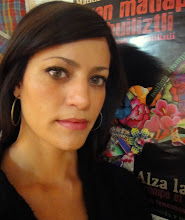
Last week was the first official week of classes, it's great to be back in the classroom environment because I always learn so much. To kick off this semester (that's 6 months long by the way!!), the department I'm studying in, Rural Sociology, had a week long seminar entitled, "Rural Sociology in the World Today". Lecture topics included "Indigenous Communities and Human Rights", "Neoliberalism and the Economic Agriculture Crisis", "The Civilization Crisis: the Dilemma between Industrial Agriculture and Agroecology" among many other interesting topics. Besides learning more about the current situation of Mexico's rural indigenous and campesino communities, I wrote down a number of great ideas and points many speakers made that I wanted to share with you, some great food for thought. These are things that many people don't think about, but all topics that are of dire important and most importantly things that we all as individual have an important role in-
1. Are we going to transform our society or create a new society and what does the creation process look like?
This is a great question, what will our future look like? It is in our hands. The creation of society begins with the creation of the individual and how the individual constructs identity. Are we able to create new ways of thinking and perceiving the world in order to create the change needed for a more harmonious future? Speaker Victor Toledo suggest three transformational steps for a new society,
1. Change at the personal level of the individual. This means doing "small" things like keeping a compost bin at home, walking to work instead of driving, practicing loving-kindness etc.
2. Retrofitting our homes to be more efficient and sustainable, this includes having energy efficient appliances, creating your own energy, creating systems to harvest water for at home use etc. This is not an option for many people who live in poverty and cannot afford to retrofit their home. For many others, this is a question of priorities.
3. Building a sustainable and peaceful community. This requires an effort to get to know your neighbors, organize and work together to build a safe and green neighbor, town or city.
Toledo believes that social change will come from the people and not politicians, that concerned community members are the ones who will really make the changes needed to create a better future for today as for future generations.
2. A time of crisis is an opportunity for positive change.
We must organize to create social order and movement, but NOT in place of politics. Social movements and politics go hand-in-hand. The neoliberal capital and industrial economic and social systems are falling apart crumb by crumb, we are consuming our finite resources of fossil fuels at a rate so fast that in the near future they will not be an option, we are depleting our oceans of it's life, creating mass soil erosion on every continent and destructing the very ecosystems that filter pollutants and maintain natural order and harmony, our entire global system of food production which is dependent on fossil fuels cannot continue (thus world food crisis), the huge economic and social void between the world's rich and poor continues to widen etc. etc...This is a time where things have to change if we wish to continue living. Some may say this is scary, but I believe that this is the best time to make some real, on the ground change for the better. Our current systems obviously aren't functioning in the benefit of nature and humanity so what are we going to do about it? What path will WE, you and me choose? This is an exciting time to really create radical change and change that comes from the people. We need to create new concepts and look at the world with different eyes. We need to create new definitions of science, of identity, of benefit and profit.
3. The development and rapid growth of capitalism was dependent on the formation and growth modern science and vise-versa.
4. We need to break current paradigms that no longer function.
Example: The modern conventional doctor is essentially an engineer of the human body. We have specialists/experts of all kinds...the individual becomes fractionated. The view of the entirety of the person and body becomes lost. We are machines that become maintained by popping pills to address specific problems when many times the issue is much more complex. Pharmaceutical companies have made a killing from well contributing to the addiction and over prescription by doctors. More and more people have poor health, something needs to change. We cannot ignore that the physical is connected to the emotional, spiritual etc. and that looking at the human body as a machine is not acceptable. This is just one example of social systems that don't work. We each have the power to change this.
5. Social responsibility as individuals (see next blog post for more information).
These are just a few ideas I really liked from the seminar last week and hope you all take the time to contemplate each point and decide how you are going to contribute to the current world situation.




No comments:
Post a Comment